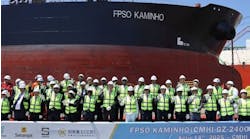Commercial activity in the UK oil and gas basin fell to a 10-year low in 2006 with just 17 assets (oil and gas fields and associated infrastructure) changing hands in deals valued at an estimated $1.7 billion. This was down significantly from 2005 when assets valued at $8.9 billion were traded through 29 deals, and continued the downward trend since the most recent high in 2000 when $11 billion was traded through 35 deals.
Encouraging a high level of corporate activity in the mature UK sector of the North Sea has been one objective of the collaborative work undertaken in recent years by the government with the industry through its joint initiative, PILOT. An active asset market is seen as a barometer of the basin’s future health and as a means of sustaining investment in the province in the longer term to ensure maximum recovery of the UK’s estimated remaining reserves of 16-25 Bboe. A sudden drop in the number of deals is a cause for concern and inevitably raises the question: Why?
True, high oil prices have given little reason for companies to sell but soaring costs also have played their part, making smaller companies think twice about committing to fresh acquisitions, whether in new development or existing production. UKOOA found in a recent member survey that unit operating cost for existing fields in the UK North Sea leapt from $5 in 2003 to $9-$10/boe by 2006, while the cost of bringing new developments on stream looks set to rise to around $25/boe over 2007-9.
But, it is the outstanding issue of decommissioning liabilities which increasingly casts a shadow over the asset market, particularly for mature fields heading towards the late stage of their productive lives.
Currently, the Petroleum Act 1998 imposes some unusual obligations on the sale and purchase of assets in the North Sea, which is beginning to depress asset trading and investment in the UKCS. It is in everyone’s interest to ensure that decommissioning obligations and liabilities are funded properly, but current government policy requirements drive particularly onerous security provisions for the UK oil and gas sector. The Act can be used to hold the asset vendor liable to the government for the decommissioning of the asset, in the event that the purchaser defaults on removal, regardless if they’ve sold it or not.
UK legislation allows decommissioning liabilities to extend beyond the normal timescale for exploration and production operations. Usually the liability moves on the sale of an asset with the license transfer. But the UK Department of Trade & Industry (DTI) can compel parties to retain the liability even though they have no further economic link with the license.
While this is seen by government as a means of providing extra security against future decommissioning liabilities, it is proving a major barrier to asset trade.
To manage this ongoing decommissioning liability, existing parties often require financial securities from those coming in, if the deal includes taking on these liabilities. Over 80% of all UK offshore decommissioning liabilities are in the hands of strong, investment grade companies, and much of the remainder is secured by bank letters of credit. But, such is the weight of the required provision, recent estimates show that the cost of providing these guarantees often exceed the risk of default.
The situation is burdened further by uncertainties concerning future tax relief, with the asset owner uncertain whether the government will fund its share of the decommissioning costs. This, therefore, leads to companies having to post decommissioning guarantees on a pre-tax basis, which can effectively triple their security costs.
Moreover, there also are large uncertainties around the costs that need to be secured. Depending on the methodology - how you treat large structures, pipelines and wells for example - the total cost of decommissioning all of the UK’s offshore infrastructure could lie somewhere between $30 to $40 billion.
Taken together, these factors create substantive barriers to successful asset transfer negotiations, the impact falling mainly on smaller, incoming companies who find the expenditure required competing with the funding they need to invest in developments.
The need for change is recognized and the industry has been working steadily with government over the past two years on a number of possible solutions. Guidelines which will help to standardize decommissioning cost estimating and contracting are due to be published this summer.
A standard decommissioning securities agreement has been drafted to help streamline negotiations between joint venture partners. This takes the form of a template contract, with options for existing fields and new joint-operator agreements. It would reduce the cost of providing securities, remove duplication and ensure that provisions are appropriate and tied to cost guidelines. It also should serve to expand the range of approved financial security guarantee options, which will benefit all concerned.
The standard agreement would have one further vital purpose. Its use should allow partners selling out of a joint venture to leave an asset without the threat that at some point in the future they might be called upon by the UK government to cover its decommissioning costs. A key objective therefore is to reduce the risk of default and provide sufficient protection for all parties, government included, so that government can dispense with the need for the burdensome obligations currently required by the Petroleum Act.
Appropriate legislative and fiscal changes will be required to make this happen. Government has its part to play in moving the issue forward. The challenge, for both the UK industry and government, is to find a risk-based solution to the financial issues through a practical legislative and fiscal framework which balances the need for future investment with appropriate securities for all.
Mike Tholen
Economics and Commercial Director, UKOOA
This page reflects viewpoints on the political, economic, cultural, technological, and environmental issues that shape the future of the petroleum industry. Offshore Magazine invites you to share your thoughts. Email your Beyond the Horizon manuscript to Eldon Ball at[email protected].


